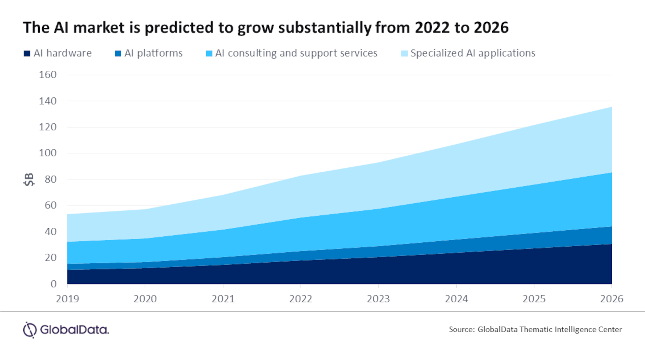Machine learning has the potential to improve efficiency, increase production and reduce costs in the oil and gas industry.

Machine learning insights
- Machine learning has many uses in the oil and gas industry and its usage is increasing rapidly.
- Major oil and gas companies are developing tools with machine learning to address business problems.
- The technology has the potential to revolutionize exploration, production and operational safety in the industry.
Machine learning is a rapidly growing field in the oil and gas industry. It can be used to analyze seismic data, well logs and other geologic data to identify potential oil and gas reservoirs. Machine learning algorithms are also capable of analyzing production data and identifying patterns that can be used to improve well performance. Machine learning has the potential to improve efficiency, increase production and reduce costs in the oil and gas industry.
In GlobalData’s thematic report titled, “Machine Learning in Oil and Gas,” an overview of the machine learning technology and its growing importance in the oil and gas operations is provided. It also highlights the efforts of major oil and gas companies, such as BP, ExxonMobil, Saudi Aramco, Shell and TotalEnergies in the development and implementation of machine learning tools to address business problems.
Ravindra Puranik, an oil and gas analyst, said, “The oil and gas industry has experienced two massive disruptions in just three years in the form of COVID-19 and the Ukraine war. While the former impacted the global energy demand, the latter caused upheaval in the oil and gas supply chains following the sanctions on the world’s top energy supplier Russia. This has necessitated increased oversight and performance optimization across all functions, including project design, construction, logistics, inventory management, and maintenance. Above all, companies also want better oversight into market demand to align their production. The goal is to find every opportunity to lower costs to sustain in the long-term.”
Machine learning will benefit companies in this scenario, by driving automation, process improvement and demand forecasting. It can support in modernizing maintenance practices, detecting leakages, streamlining data management and documentation, optimizing inventory and supply chains.
Puranik says: “Machine learning is a rapidly growing field in the oil and gas industry and can potentially revolutionize how companies explore and produce oil and gas. It is largely used to automate repetitive tasks and support in seismic data interpretation and performance optimization of operational equipment. The technology is also highly useful in predicting potential equipment failures, thereby preventing any untoward incidents and boosting operational safety.”

The Organization for Economic Co-operation and Development (OECD) estimates that AI could add as much as $16 trillion to the world’s GDP by 2030, equivalent to more than 10% of the gross world product.
Puranik said, “Oil and gas companies have deployed machine learning algorithm to track performance across diverse assets, such as drilling rigs, pipelines, LNG facilities and refineries. The technology is also aiding companies in inventory management and supply chain optimization. Moreover, a new use case is emerging for AI among the industry participants concerning carbon sequestration. Researchers at ExxonMobil, Equinor and others are using machine learning tools to study seismic data and narrow down potential sites for storage of captured carbon dioxide. Machine learning has vast potential in the energy sector and will continue to find new applications to automate and optimize.”
– Edited from a GlobalData press release by CFE Media.



